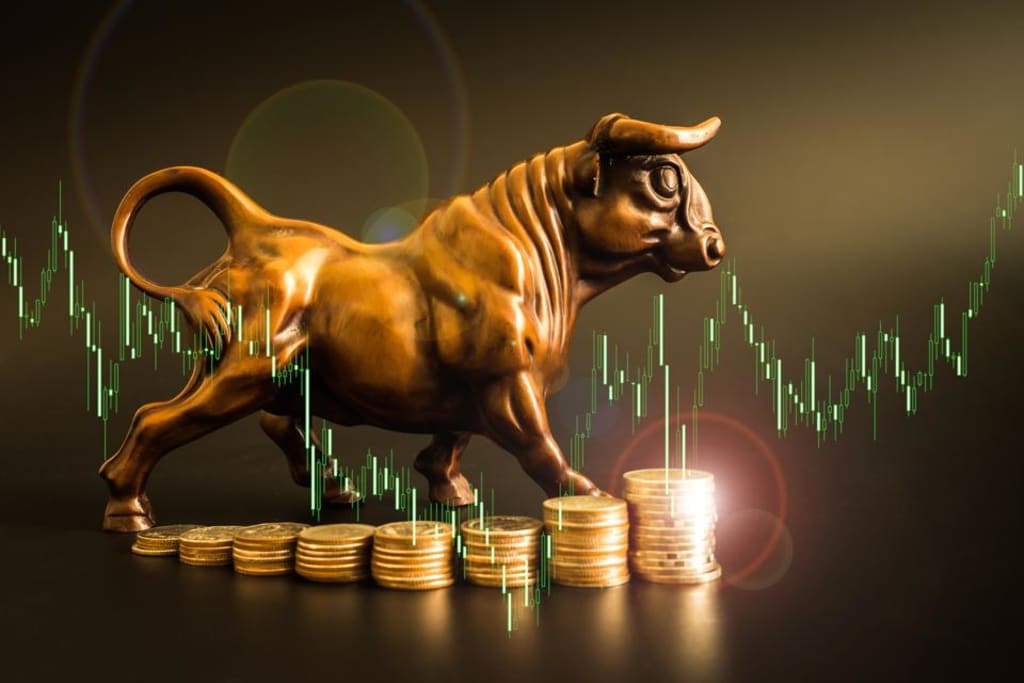
A bull market refers to a period of time in the stock market when the prices of securities are rising, typically accompanied by high investor confidence and optimism. In other words, it's a market trend characterized by a general increase in prices over a prolonged period of time. The term "bull" is used to describe the upward movement of the market, as the upward thrust of a bull's horns is similar to the way prices move higher during a bull market.
During a bull market, investors are more likely to buy stocks and hold on to them, even as prices rise, with the expectation that prices will continue to increase. This creates a self-fulfilling cycle, as the increased demand for stocks pushes prices higher, which then attracts more investors, and so on. This is in contrast to a bear market, which is characterized by falling prices, reduced investor confidence, and increased pessimism.
Bull markets can be caused by a variety of factors, including a strong economy, low interest rates, increasing corporate profits, and favorable government policies. In a strong economy, consumer spending is high, and businesses are performing well, which can lead to higher stock prices. Low interest rates make it cheaper for businesses to borrow money and invest in expansion, which can also lead to higher stock prices.
It is important to note that bull markets don't last forever, and eventually, the trend will turn, and the market will enter a bear market. This can be due to a variety of factors, including an economic slowdown, rising interest rates, declining corporate profits, or a shift in investor sentiment.
Investors often try to profit from a bull market by buying stocks at lower prices and selling them at higher prices later. This can be done through a variety of investment strategies, such as dollar-cost averaging, where an investor regularly invests a fixed amount of money into the market, or by using technical analysis to identify buying and selling opportunities.
While a bull market can be a great opportunity for investors to profit, it is important to keep in mind that stock prices can be volatile, and the market can experience significant drops, even during a bull market. Therefore, it's important to have a well-diversified portfolio, and to be prepared for both the ups and downs of the market.
In conclusion, a bull market is a period of rising stock prices and increased investor confidence, characterized by a general increase in prices over a prolonged period of time. It is important to understand the factors that can cause a bull market, as well as the potential risks, in order to make informed investment decisions.
A bull market is a financial market in which stock prices are rising or are expected to rise. It is characterized by optimism, investor confidence, and increased buying. This increased demand for stocks drives up their prices, creating a virtuous cycle where higher prices lead to even more buying and higher prices still.
Bull markets are often accompanied by strong economic growth, low unemployment, and low inflation. These favorable conditions create a positive outlook for companies and their future earnings, which in turn attracts more investment.
Bull markets can last for months or even years, but they eventually come to an end as the underlying economic conditions change. For example, as the economy slows down, companies may start to struggle, leading to lower earnings and lower stock prices. This can trigger a selling panic as investors rush to exit the market before prices fall further.
The opposite of a bull market is a bear market, in which stock prices are falling. Bear markets are characterized by pessimism, investor fear, and decreased buying. They often occur during economic recessions or when there is a significant decrease in the overall level of business activity.
It's important to note that stock prices can also rise for reasons that are not necessarily indicative of a bull market. For example, a single company's stock price can rise because of a major product launch or a merger and acquisition.
In a bull market, investors who buy stocks at lower prices and hold onto them as prices rise can make substantial gains. However, it's important to keep in mind that bull markets can also be risky. When prices are rising, it's easy to become overly optimistic and make impulsive investment decisions. It's important to have a well-diversified portfolio and to make investment decisions based on a solid understanding of the underlying economic and market conditions.
Additionally, bull markets don't last forever, and when a bear market does arrive, it can be swift and brutal. Investors who become too heavily invested in the stock market during a bull market may find themselves facing significant losses when prices start to fall.
Overall, while bull markets can be an attractive opportunity for investment, they also require careful consideration and risk management. It's important to be aware of the underlying economic and market conditions, and to make investment decisions based on a long-term perspective and a well-diversified portfolio.
About the Creator
Kumara Swamy
Creator





Comments
There are no comments for this story
Be the first to respond and start the conversation.